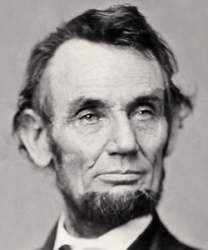Record Data
Source citation
Abraham Lincoln, Response to a Serenade, July 7, 1863, in Roy P. Basler, ed., The Collected Works of Abraham Lincoln (8 vols., New Brunswick, NJ: Rutgers University Press, 1953), 6: 319-20, http://quod.lib.umich.edu/l/lincoln/.
Type
Speech
Date Certainty
Exact
Transcriber
Transcription adapted from The Collected Works of Abraham Lincoln (1953), edited by Roy P. Basler
Adapted by Matthew Pinsker, Dickinson College
Transcription date
Transcription
The following text is presented here in complete form, as it originally appeared in print. Spelling and typographical errors have been preserved as in the original.
July 7, 1863
Fellow-citizens: I am very glad indeed to see you to-night, and yet I will not say I thank you for this call, but I do most sincerely thank Almighty God for the occasion on which you have called. [Cheers.] How long ago is it?---eighty odd years---since on the Fourth of July for the first time in the history of the world a nation by its representatives, assembled and declared as a self-evident truth that ``all men are created equal.'' [Cheers.] That was the birthday of the United States of America. Since then the Fourth of July has had several peculiar recognitions. The two most distinguished men in the framing and support of the Declaration were Thomas Jefferson and John Adams---the one having penned it and the other sustained it the most forcibly in debate---the only two of the fifty-five who sustained [signed?] it being elected President of the United States. Precisely fifty years after they put their hands to the paper it pleased Almighty God to take both from the stage of action. This was indeed an extraordinary and remarkable event in our history. Another President, five years after, was called from this stage of existence on the same day and month of the year; and now, on this last Fourth of July just passed, when we have a gigantic Rebellion, at the bottom of which is an effort to overthrow the principle that all men were [are?] created equal, we have the surrender of a most powerful position and army on that very day, [cheers] and not only so, but in a succession of battles in Pennsylvania, near to us, through three days, so rapidly fought that they might be called one great battle on the 1st, 2d and 3d of the month of July; and on the 4th the cohorts of those who opposed the declaration that all men are created equal, ``turned tail'' and run. [Long and continued cheers.] Gentlemen, this is a glorious theme, and the occasion for a speech, but I am not prepared to make one worthy of the occasion. I would like to speak in terms of praise due to the many brave officers and soldiers who have fought in the cause of the Union and liberties of the country from the beginning of the war. There are trying occasions, not only in success, but for the want of success. I dislike to mention the name of one single officer lest I might do wrong to those I might forget. Recent events bring up glorious names, and particularly prominent ones, but these I will not mention. Having said this much, I will now take the music.


